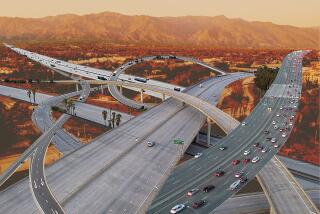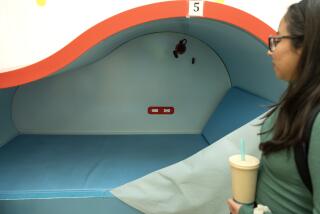On Heart Rates, Driven Personalities and Commuter Stress
- Share via
It’s official: Bad traffic can be hazardous to your health.
Scientific studies show it can make you crabbier, make you more easily frustrated, make you drive more impatiently and make your blood pressure rise.
Surprised?
OK, so it’s not exactly a cure for cancer or the common cold. It doesn’t take a rocket scientist to figure out that gridlock is a bummer.
But it does take a psychologist at one of Southern California’s most respected educational institutions to put the imprimatur of serious academic inquiry on what seems like basic intuition to most of us Angelenos.
For the past 15 years, UC Irvine Prof. Raymond W. Novaco has examined the effects of commuter stress in studies that may be unique in the United States. His monographs demonstrate that long commutes can intensify negative feelings, lead to lower productivity in the office and even make us sick.
In less obvious findings, Novaco has also discovered that heart rate is not affected by traffic, women get more stressed than men on the daily drive, and, in a twist on pop psychology, Type B personalities--the more mellow folks--become more agitated in traffic than Type A control freaks.
*
True, not everyone is impressed with such scholarship, especially its more predictable aspects.
“It’s like saying if there’s increased crime in your neighborhood, you’re going to be more frightened,” says Santa Monica psychiatrist Mark Goulston.
But at the first suggestion that he studies the self-evident, Novaco bristles.
“Would you know there aren’t heart-rate effects? Would you know there aren’t positive-mood effects?” he says testily, challenging a reporter to “bring your bank account” and bet on the outcome of his next study if the results of commuting stress seem so obvious.
By “positive-mood effects,” Novaco means the curious finding that if you leave in a happy frame of mind, a bad commute isn’t likely to sour you. But if your temper is already worn thin by the kids or the job or Robert L. Shapiro or Marcia Clark, traffic congestion will further blacken your mood, especially at the end of the day, the peak commute-stress time.
Tom Sediva believes that.
Sediva, owner of a Downtown publishing business, endures a daily 22-mile commute between his office and his Hacienda Heights home. On some nights, it can take Sediva more than an hour to reach his front door, in a mood bordering on antisocial.
“I get home on those days, I go up to my room, I turn on the TV, I lay down on the bed and I stay there by myself,” he says. “I’ve got a son who comes home at that time eager to talk about anything, and I don’t want to hear it. And then I feel guilty about the whole thing.”
Sediva notices physical effects, too--or at least psychosomatic ones.
“When you do make it home at a good pace, you can almost bounce out of the car. But when it takes that long, it just seems that . . . every bone in your body starts hurting. It’s not a physical thing. It’s just something in your head.”
Not all of it is purely psychological, though.
Novaco’s research shows that the farther the commute, the higher the blood pressure of the commuter, although the heart rate stayed constant. Subjects with frustrating commutes experienced a higher incidence of illness and chest pain. Also, the more roads a person takes during the commute, the more likely he or she is to call in sick.
People will change jobs because of a bad commute. That, coupled with reduced productivity and morale from transportation stress, might make it wise for companies to sponsor alternative ways for employees to get to work, like ride-sharing, says Novaco. In fact, ride sharers report lower blood pressure than solo drivers.
So how long does it take Novaco himself to drive from home to work at UCI?
“Eight minutes or less,” he says. “It’d be a total waste of time to spend an hour in the car. It has a bad effect on me when I have to drive to Downtown L.A.”
*
Among the more intriguing findings in Novaco’s studies are the differences between personality types and between the sexes in coping with the daily commute.
Women don’t do well. Although in Novaco’s study groups they had the highest household incomes and greatest levels of involvement in their jobs, women who drive alone are the most prone to commuting stress and feel the most rushed in the morning getting to work.
This might have something to do with the many competing demands women must juggle at home and the office, but--at least to Novaco--”that remains unclear.”
Contrary to popular logic, Type B personalities, people who tend to go with the flow, also fare worse in gridlock than their more uptight Type A counterparts.
Psychiatrist Goulston hypothesizes that Type A folks approach traffic with the same wound-up style they confront the rest of life with.
“The rest of their life’s like a pressure cooker, and a traffic jam is just like a pressure cooker. They tolerate it better,” Goulston says. “Whereas for a Type B personality, who does everything in moderation, a traffic jam is not like the rest of their life. It’s like an immersion into a Type A type of situation.”
Novaco notes that Type A people also try to optimize their commuting environment by listening to educational tapes or installing a car phone to maximize the drive time.
But of course there are exceptions. As a solo woman driver, Dawn Reisner of Bellflower falls into the highest stress category. But the 20-mile drive to her job selling men’s suits at the Redondo Beach Nordstrom doesn’t faze her.
“There’s nothing I can do about it,” says Reisner. “No reason to have any more gray hair than I have now.”
More to Read
Sign up for Essential California
The most important California stories and recommendations in your inbox every morning.
You may occasionally receive promotional content from the Los Angeles Times.











